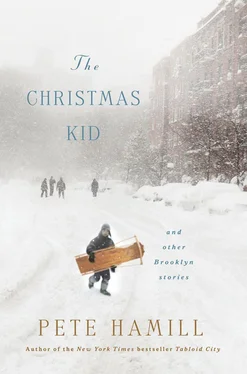
The Christmas Kid
And Other Brooklyn Stories
by
Pete Hamill
This book is for — in no particular order — the people from my Brooklyn hamlet: Tim Lee and Jack Daugherty, Patty Rattigan, Georgie Loftus, Dick Ganley, Frank and Red Cioffi, Geordie Stewart, Harry Kelly, Buck Vermilyea. It’s for Mr. and Mrs. Mike Caputo and their kids, Junior, Sonny, and Babe. It’s for Ann Sharkey and Mae Irwin, Carrie Woods and Cliff, for Mae, Marilyn, and Jackie McEvoy, Dottie and Pete DeRossi, Harry Kerniss, Walter Wagner, Jack O’Loughlin, and Sam Brody. It’s for Billy Begley, Hoppo Chambers, Gil and Kenny Hope, Mike and Sonny Fischetti, Mr. Greenberg, Mr. B., Mr. Fortunato, Mr. Gutter, Mom and Pop Sanew. It’s for Jim Brady, Wimpy Vento, Noona Taylor, for Billy Delaney, Vera, Paul, and Sara DeSaro, Harold Sicker. It’s for Marion and Dom, Cookie, Tommy, and Laura Ventriglio, Billy Rossiter, Jimmy Lanzano, Raymond Dix, Harry D’Arcy, Eddie Prybys, Nit-Nat DelVecchio, Billy Boy Sirico, Joe Kelly and No-Toes Nocera. It’s for Catherine and Rosie Rogan, Roberta Perrin, Mary Cottingham, Betty Kayata, Mary Christopher, Marilyn Lawless, Lorraine Hines, Betty Gahan, Dotty and Betty Long, Rosemary Malden, Jeanie Miller, Kathleen Quigley, Mary Lou Speck, Maureen Crowley, and Pat Colligan. It’s for Aggie, Bobby, and Tommy Lenihan. It’s for Josephine Wares. It’s for Georgie Lee. It’s for Dotty Condril and Dotty Meserole. It’s for Eddie Farrell, Tommy, Danny, and Eddie Mills, for Ray Garvey, Tweetsie Farrell, Jimmy Houlihan, Mike Lee, Bill Powers, Jake Conaboy, Richie Kelly, Ralph Squicciarini, Jackie Heegan, George Planco, Duke Baluta, John Yard, and Eddie Cush. It’s for Danny Gorman, Downtown Ronnie, and Donald O’Connor. It’s for Shrovelhead, Ray Grillo, Icebox McNiff, Mousey Malone, Lefty Murray, Blackie the Cop, Pinhead Lupinsky, Bubba Lee, the Fryars, the Spillanes, the Kanes, the Egans, the Wallaces, the Donnellys. It’s for Pat Fenton. It’s for Steve Jerro, Joe Attara, Eddie Lauterbach, Gerard McGrath, Harold, Tommy, and Billy Gates. It’s for Jerry and Whitey Mackie, Jimmy Blatz, Howdy Doodie. It’s for Joe Whitmore and his daughter, Pat, for Dinny Collins, for Jimmy and Peter Budgell, for John Duffy and Jim Shea, Unbeatable Joe, Mr. Semke, Jackie Metcalf, Ronnie Zeilenhofer, and Alvera the Bush. For Nat the Laundryman, Teddy from the fruit store, and Mr. Glass the glazier. For Vito Pinto, Boopie Conroy, Johnny Rose, Jack McAleavey, Mickey Horan, Eddie Griffin, Eddie Norris, Fabulous Murphy, Hot Dog McGuinness, and Joey Corrar. It’s for Willie Sutton. It’s for Toddo Marino.
All were residents of my Brooklyn shtetl. All remain alive as long as some of us are alive.
…I had my existence. I was there.
Me in place and the place in me.
— Seamus Heaney, “A Herbal”
MOST OF THESE TALES were first published on Sundays by New York’s Daily News in the early 1980s. The original notion was to bring short fiction back into a newspaper, in the tradition of O. Henry in New York, Alberto Moravia in Rome, Kafū Nagai in Tokyo, and many others in many countries. These tales are set in Brooklyn, the large, dense, beautiful borough where I was born and grew up. I will carry the place with me to my grave.
Many of these stories are charged by the city’s most enduring emotion: nostalgia. Two factors still drive that emotion: the rapidity of change in New York and the immigrant roots of almost all its inhabitants. You go away for a month, and when you return your favorite coffee shop is being gutted to make way for another jeans shop. You ache for people gone, and places, and music, for lost loves, absent friends, vanished games, departed baseball teams. Immigrants might have been hurt into exile, as my parents were in the 1920s from Ireland, as millions are in today’s America, but they still yearn for old roads, familiar smells, special foods, for songs, for language, for old games, for parents and aunts and uncles, for homes where they knew every inch of each room, even in the dark. Whatever brought them to New York — bigotry, hunger, oppression, war — the Old Country was still the place where they once ran barefoot in the grass. Everyone’s present also contained a past. Then. Now.
The Brooklyn neighborhood where I grew up is now called the South Slope. When I was young it was an unnamed wedge between the brownstones of Park Slope and the solid lower-middle-class houses of Windsor Terrace. The inhabitants were almost all immigrants and their children: Italians, Irish, and a smaller number of Eastern European Jews. They were virtually all blue-collar workers, many engaged in the commerce of the port: loading and unloading cargo, transporting it to distant places. Others worked in construction, as ironworkers, wire lathers, masons, carpenters. Many (my father among them) worked in factories, including the huge redbrick mass of the Ansonia Clock factory at 12th Street and Seventh Avenue. The Factory, as we all called it, was erected in 1881 (the same year as the Gunfight at the O.K. Corral), and in 1982, when all the jobs were gone and I was writing these stories, it was converted into an excellent co-op, with a grand, cobblestoned courtyard. It’s still there.
There were saloons on almost every corner between 9th Street and 15th Street, some of them born as speakeasies during Prohibition. My father’s favorite was Rattigan’s, on the corner of 11th Street and Seventh, and it appears in more than a few of these tales. Like all the others, Patty Rattigan’s wonderful saloon served as an employment agency (“I just heard they’re hirin’ at American Can…”), a refuge, a music hall (“Give us a song, will ya, Billy?”), a debating society (“Hey, no politics, no religion, ya got it?”), and a social club. When someone died, they took up collections to help pay for the burial. Women were allowed into the back room, but not at the bar, and that back room was often full of people after weddings, graduations, and funerals. There were bad guys in the neighborhood, a street gang called the Tigers, along with various bookmakers and loan sharks. But most of the people were decent, including the Mob guys. Woe to the punk who hurt a child or an old person. If the cops didn’t find him, the Mob guys would. Even they believed in rules. So did the crowd at Rattigan’s. Most sins were forgiven as long as you always paid your debts, voted the straight ticket (the Democratic Party), and never, ever crossed a picket line.
Most adults in the neighborhood had come through the Depression and the war. Their most important four-letter word was work. They never envisioned having something as grandiose as a career; that was for their children. But work meant they could put money on the bar on a Friday night and still have something left in the morning. On holidays, graduations, christenings, Bar Mitzvahs, they could even buy gifts for their kids. As a child, I often heard their mantra: a day’s work for a day’s pay. Work gave them pride. With any luck, they would work until they died. And the world would stay the same. Peace. Steadiness. Even some happy endings.
The world didn’t remain the same. The Korean War meant that we had not seen the end of war. Young men who were thirteen when World War II ended were now being drafted and trained to kill for their country. If most Brooklyn veterans of the first of those wars used the GI Bill for housing benefits, the Korean veterans began using it for higher education. I was one of them, but I was certainly not alone. Everywhere in our country the tradition of following your father into his union started to end. But there were other huge changes underway. The arrival of television. And, much worse, the spread of heroin. In a neighborhood where none of us owned anything worth robbing, locks appeared on all the doors.
Читать дальше













